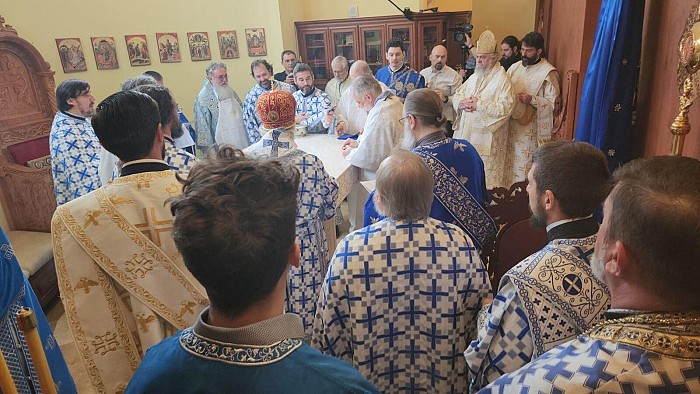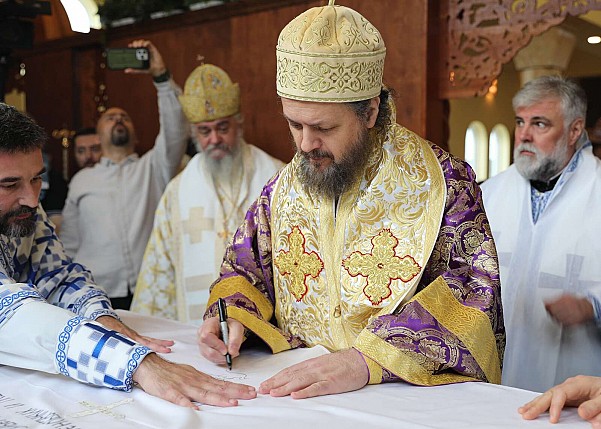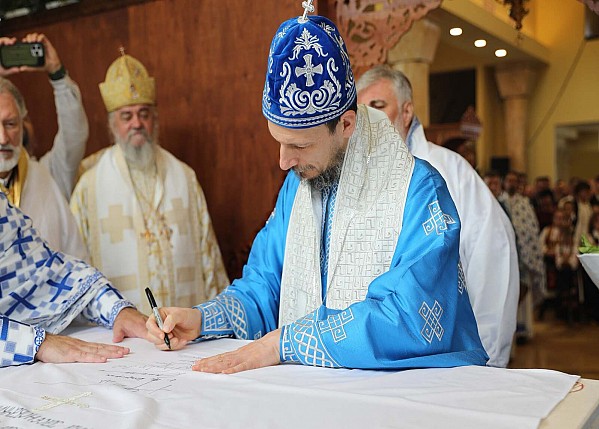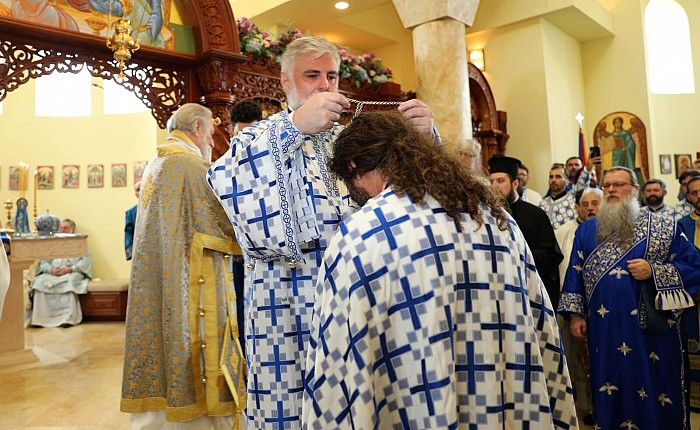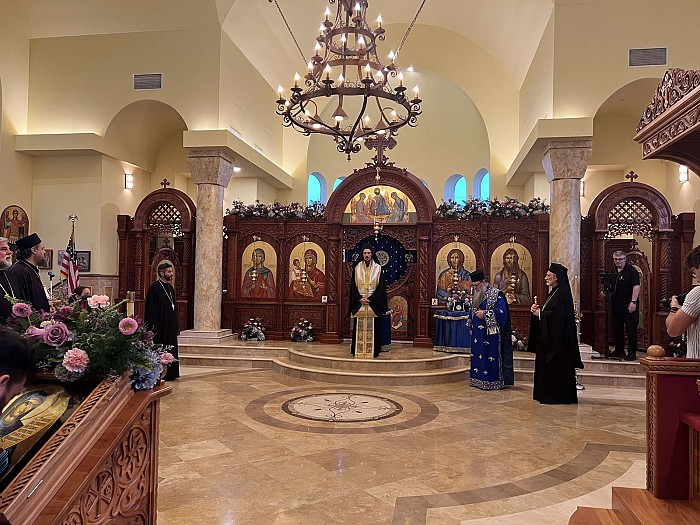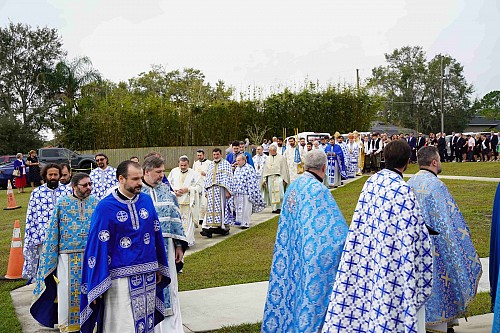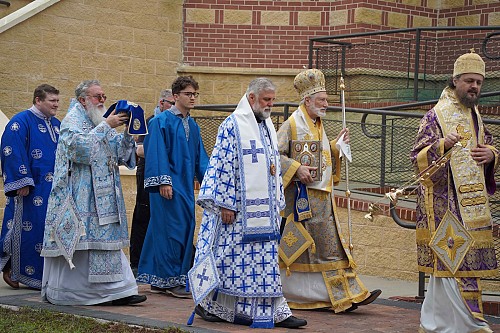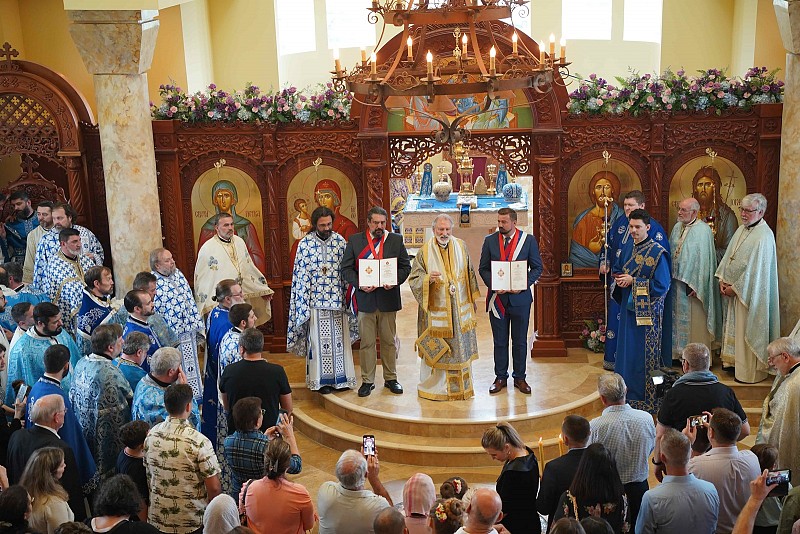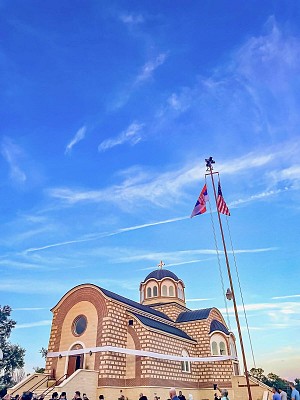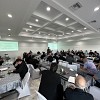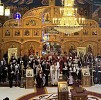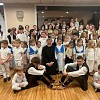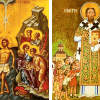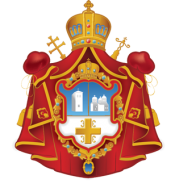Throughout history, the meaning and significance of the temple, as well as its construction and adornment, has occupied the attention both of our, and the world’s, great minds, illustrious hierarchs and theologians of the Church, as well as secular Men of Letters and rulers. To them, we dedicate this day - they who united endowment and the power of the inspired written word: from the Psalmist King David to our Nemanjics and Lazarevics, who succeeded in harmonizing the apparent incompatibility of the heavenly and the earthly, incorporating themselves into the living temple, and being crowned with an imperishable crown of sanctity.
Both in Church songs, and their personal hymns, troparia and kontakia, they are described as surreal or, in modern jargon, fairly-tale characters, “who walk on earth but live in heaven”, or as “Angels in the flesh”, living accordantly with God; they who strove all their lives and with all their being to “touch Heaven” could, with the Apostle Paul, proudly say: “It is no longer I who live, but Christ lives in me.” (Gal. 2:2). Which is to say that holiness knows for no bounds, but moves all boundaries, expanding the heart to contain the Uncontainable, annulling both time and space as basic units of existence; instead, as measures for human existence and dignity, substituting immeasurability - “the measure of the growth of the fullness of Christ” (Eph. 4:13).
The event in which this sacramental and spiritual transposition of earth to heaven takes place is none other than the Divine Liturgy. The same one that we celebrate from the miraculous night of the Mystical Supper until today - identically celebrated whether under open skies, in deep catacombs, or in magnificent temples with one sole purpose - to transfigure and deify everything, in communion with the Impassible and Eternal God. That unceasing Divine Liturgy, continuously celebrated through the ages, makes of our hearts and temples in which we liturgize, gathered in the Name of God, and offering unto Him gifts along with all our endeavors, our entire lives, for the sole purpose of sanctification: that they, by the Life-Giving Holy Spirit, may become the heavenly Jerusalem and the Mt. Athos of the Most Holy Mother of God, whether we are in our birthplace or, as the children of God, scattered from Australia to America. This sole purpose and meaning of the Divine Liturgy, shapes our temples endowing them with purpose and essence, and making of them, as light through a convergent lens, the recalescent point of God’s grace.
Because of this, certain of the holy fathers enumerated the dedication of a temple, as the place for the celebration of the Divine Liturgies, amongst the Holy Mysteries of God, linking it with the Holy Mystery of the Church in general, i.e. as its visible manifestation, the building up of the Body of Christ, and the place of the sanctification of her members or, better stated, parts of that eternal organism (1 Cor. 10:17), as St. Paul illustratively describes the Church and us within It (where all members are equally essential and irreplaceable, as is realized in those circumstances that experience the successful construction of temples). Naturally, from the previously stated it is not surprising, and has long been commented, that Orthodox faithful in the daily course of their lives, call their temple “church” and equate the one with the other (+Metropolitan John of Pergamon). This, precisely, validates the transcendent words of the holy and divinely-wise Gherman of Constantinople, said thirteen centuries ago: “The Church is the temple of God, a holy place, a house of prayer, an assembly of the people, the Body of Christ. Her name is the Bride of Christ…the Church is heaven on earth, in which the supra-heavenly God abides and walks. She represents the crucifixion, the grave and the Resurrection of Christ.”
All of this is a reminder that we also, if we desire, can be the protagonists and stars of that heaven, and of those ideals which, as Christians, we always possess, but from which we have, not rarely, deviated; seeking wonders in fleeting glimmers of the temporal sparkles in the effulgence of this world, which only momentarily manages to dazzle and obscure the shine of the unfading, gentle, Light of Christ.
Nonetheless, one luminous and exceptional example of ours, and long-awaited by our generation, we find these days, imagine, in the southern-most regions of the North American continent - in sunny Florida where, in a relatively short period, five to six temples have been built to the glory of God, dedicated to His wondrous saints. Indeed, it seems that the grace of God, as opposed to the destructive hurricanes characteristic of these climes, unselfishly splashed, especially, on the south-western shores of this peninsular American state, beginning from Miami, through St. Petersburg, Clearwater and North Port, to the newly consecrated church in Orlando; not only a city of magical cinematography, but also a surrounding of wondrous beauty, accentuated by the equally wondrous fact that it is an area with the most lakes and sources of fresh water in the world, while being such a small area so close to the Atlantic Ocean.
Precisely this place, in Florida, these days has been the center of the All-Serbian and Pan-Orthodox celebration of the consecration of the newly constructed church of Saint Petka which, I believe, became for our people, from their immediate and distant surroundings, an inexhaustible "spring of living water." And for this small miracle (you will come to know why the raising this temple truly is one), were needed, along with the efforts of predecessors and newcomers-refugees who arrived, as is correctly observed: with only one suitcase of possessions in their hands to, "behind the seven mountains and seas" , arrive in the fair environs of Lake Mary, a suburb north of Orlando, join Father Ljubiša Brnjoš, who faithfully served this parish for the past eighteen years, having also migrated on the road from Leotar to Longwood.... And they came, he and his wife, with their then still young children, quietly and modestly bearing, instead of material wealth, mutual love and a broad smiles - as bright as the sun of Herzegovina - with which they will surely welcome you even today, and completely disarm you, having spent almost two full decades in the same place, with the same people, and with undiminished ardor in their eyes…
Ducić’s, fellow citizens did not lack faith or knowledge; neither before nor today. The same applies to our virtuous and gifted priest who was considered a kind of prodigy in high school both in science , mathematics and sport (basketball). Still, he subordinated his gifts to the humility and godliness of the Tvrdos Monastery. At the time, the Monastery, like the whole of Herzegovina, was being rebuilt by the true church-lover and prophet of God, Bishop Atanasije Jevtić, with the newly formed brotherhood in whose ranks were, following the death of the only monk until then, Father Georgije, the long-timekeeper of the relics of St. Basil, cultivated over shorter and longer periods, as monks and hieromonks, the current bishops Grigorije, Jovan Purić, Maxim, the current abbot Father Vasilije of Zavala Monastery, the late monk Simon of Vatopedi, Isaiah of Zubci, and others, until the arrival of the current bishop of Herzegovina, Dimitrije (also present at the consecration of the temple), and the newer generation of monks. In the spiritual formation and development of the young generation of monks, and of Father Ljubisa, is the unforgettable and irreplaceable gentle character of the elder Simeon Dobrićevski (a long-time resident of Stolac who, after returning from WW2 camp in Dachau, was the parish priest of All Hercegovina. ‘Pop’ Slobo, as we affectionately called him, ministered, I believe, to all monasteries from Ostrog through Duzi, Tvrdos, and Dobrićevo. His life experience, spiritual joy, and innate Herzegovinian solid nature, made of him a peaceful harbor, an oasis of tranquility, spiritual comfort, and life’s lessons.
Those who lived with Bishop Atanasije and Elder Simeon in those years knew and believed, like many others, that with God's help, nothing is impossible. Still, if it is not immodest to say, they experienced themselves the strength of the Lord’s right hand and His providence. The scene around the temple just before the consecration also confirms this. When you behold the generation of children from that time (who actually brought by the hand their parents, aunts, and uncles to Trebišnjica to be baptized in Tvrdos Monastery), here in a foreign country, with the same enthusiasm of their spiritual father - unloading containers of church furniture and other necessary items, performing the final preparations; now together with their children, whom they look at with pride (and who are now the same age and older than they were in those war days in Herzegovina). And around them spiritually, generationally, both now and immemorially as relatives and kumovi, related as friends and brothers, are Fathers Ljubiša, Boris, Saša, Miloš, dean Milan, Vladan, Dragan... the chain would go all the way to the far north... in the same vocation, with the same dedication and purpose. On this fertile soil, God's "dew" came to soak the community's harmony, work, and love, which, after the refugees arrived in 1997, numbered only about a hundred and fifty families. At the beginning of the foundation in 1989, only about twenty enthusiasts dedicated themselves to raising a beautiful temple. But, without them, inevitably, not even one or two thousand newly arrived refugees, displaced and war-torn, could not help since they lacked the wherewithal. But, as is usually the case, they raised the temple, and it fortified and raised them. Over time, many established themselves materially. A small workshop of candles near the temple also helped, and the work was completed without a single dollar loan. In today's circumstances, such an undertaking is unimaginable and equal to a miracle for those circumstances.
The duo that synchronized the undertakings, both physically and technically, must also be mentioned. Marko Zečević and Vladan Gluvačević, president of the church and school board, and the chief architect of the temple, are standing here on the day of the celebration as, once again, examples. Standing as kumovi of the celebration, and having been decorated with the Order of the Holy King Milutin, our Local Church, confirmed by the Patriarch and the Synod, filled with joy and, rightfully so, with pride; and feeling that this decoration belongs to everyone, from the first to the last, each parishioner who in any way got involved and contributed to this work. As well as Father Ljubiša (and his worthy predecessors Hieromonk Nikodim Pribojan and Prota Dragan Zarić) who, awarded with a pectoral cross and the title of protopresbyter-stavrophoros, amidst a charge of emotions, and relief after so many efforts, were unable even to utter a word, from the tears in their eyes and the sobs that overwhelmed them.
Mothers, wives, and sisters, with the children of all those mentioned and not mentioned here of the parish, along with the Presbytera Natasa, who gathered around the Church, in the Circle of Serbian Sisters, and youth in the folklore section and religious studies, also made an immeasurable contribution with their activities, collecting donations, engaging in numerous actions; as well as by preparing food for events that had a humanitarian character, as well as organizing and performing the program, and serving on the day of the temple's consecration. They deserve a great, common, Decoration for their attitude, personality, and commitment.
For history, it remains recorded that the Eastern American Diocese from the 11th February and the Feast of the Transfer of the Relics of St. Ignatius the God-Bearer is richer for one more magnificent church, consecrated in Orlando in the presence of several hierarchs of Serbian Orthodox Church, numerous priests and many pious people.
The Bishop of Zahumlje and Herzegovina, Kyr Dimitrije, served the solemn Great Vespers on the eve of the temple's consecration. As the host, the Eastern American Bishop, Kyr Irinej blessed and greeted those present with inspiration.
The Processional (Litiya) part of the Pre-Liturgical celebration was presided over by the bishop of Düsseldorf , Kyr Grigorije, with the Liturgical synaxis of the Bishops of New Gračanica, Kyr Longin from Chicago, with the concelebration of the host Bishop Kyr Irinej, the Canadian Bishop Kyr Mitrophan, who greeted the guests at the agape, especially reminding all the deserving founders and pioneers of this God-pleasing work. Bishops Grigorije and Maxim from the West-American diocese, who preached on the Gospel about the importance of the temple; Bishop Dimitrije and Buenos Aires Bishop Kirilo served together with almost the entire clergy of the local diocese, with numerous other guests: both of our Dioceses from America and several local Orthodox Churches, as well as other regions of our Churches: Archdiocese of Belgrade-Karlovac - Deacon Miroslav Vasić from Belgrade; Diocese of Zahum - Father Mladen Čalija from Nevesinje and Deacon Krsto Avdalović from Trebinje; from the Diocese of Budimlje-Niksic - Father Miajlo Backović from Tivat; from the Diocese of Austria-Switzerland, signatory of these sentences, from Vienna, as well as other distinguished guests.
On the first day following the consecration of the temple, on Sunday, the feast of the Holy Three Hierarchs, the first Divine Liturgy was celebrated, and God's blessing were imparted by Bishop Dimitrije of Zahumlje-Herzegovina and Kirilo of Buenos Aires, with clergy who did not have to leave on the same day; sealing this story with the seal of the Feast of the enlighteners and ecumenical teachers, which is, amongst all else, the life story of St. Petka to whom this newly built temple is dedicated.
On that occasion, they prayed especially, as is the practice in large sanctuaries and monasteries on the second day of celebration (which is dedicated to benefactors), that the Lord may remember known and unknown benefactors, contributors, and well-wishers no matter how much they could do and give, because the Lord sees intentions and knows everyone from the womb of his mother (Ps. 50).
With these prayers for all those who can now say they have gained here, in a foreign country, their "piece of heaven," the Commemoration Book of this temple has just been opened.
There will be many more names of those who will pass through the doors of this temple that will remain written in the book of eternity, as well as those that will come to posterity to tell its remarkable story... I was married here, I baptized my children and grandchildren, and I will go in peace to meet my Lord from here!!
In Orlando, Florida
On the Feast of the Three Holy Hierarchs
Protopresbyter Dr Gajo Gajić
Смисао и значење храма, као и само његово подизање и украшавање, заокупљали су кроз историју пажњу бројних наших и светских великана мисли, како црквених писаца и великодостојника, тако и световних људи од пера и владара. Ту су и они којима их данас посвећујемо, који су, обједињујући задужбинарство и снагу надахнућа писане речи, од Псалмопојца Давида до наших Немањића и Лазаревића, успевали повезујући наизглед неспојивост небеског и земаљског, узидати и себе у тај живи храм и крунисати се непропадљивим венцем светости.
Црквене песме и њихове личне химне, тропари и кондаци, описују их као надреалне или, савременим жаргоном речено, бајковите ликове „који земљом ходе, а небом живе“ или као „Анђеле у телу“, богоподοбне, који су настојећи целог свог живота, свим својим бићем, да „додирну небо“, могли са Апостолом Павлом поносно рећи: „Не живим одвећ ја, него живи Христос у мени“ (Гал. 2, 2), што ће рећи да светост не зна за границе, него их помера и шири срца да смести Несместивог, укидајући време и простор као основне јединице постојања, и за меру људског живљења и достојанства поставља безмерје – „меру раста пуноће Христове“ (Еф. 4, 13).
Догађај у којем се одвија ово светотајинско и светодуховско транспоновање неба на земљу није други до Света литургија. Иста она коју служимо од чудесне ноћи Тајне вечере до данас, подједнако под ведрим небом, у земуницама и велелепним храмовима, само са једним јединим циљем - да све преобрази и обожи у заједници са непролазним и вечноживим Богом. Та непрестана Божанска литургија, продужавана кроз векове, чини наша срца и храмове у којима служимо, сабрани у име Божије, приносећи му с истим циљем дарове и сав свој труд и животе на освећење, да они Светим Духом животворећим постану небески Јерусалим и Атонска Гора Пресвете Богородице, било да смо у родном крају или разасути као деца Божија од Аустралије до Америке. Тим својим јединим смислом и циљем Света литургија, обликује и наше храмове, дајући им сврху и назначење, чинећи их, као сабирно сочиво, тачком кључања благодати Божије.
Поједини свети оци због тога и освећење храма, као места служења Божанске литургије, убрајају у Свете тајне Божије, повезујући га са Тајном Цркве уопште, тј. као њеном видљивом пројавом, изграђивањем Тела Христовог и местом освећења њених чланова или боље рећи делова тог вечноживог организма (1Кор. 10, 17), како је Свети Павле сликовито описивао Цркву и нас у њој (где су онда и сви подједнако важни и незаобилазни, као што то показују и случајеви успешне градње храмова). Наравно, отуда не чуди и давно изречена опаска да Православни народи, уствари, храм и у свакодневном животу називају црквом и поистовећују га са њом (†Митрополит пергамски Јован). Управо то потврђују и нестварне, тринаест векова старе, речи светог и богомудрог Германа цариградског: „Црква је храм Божији, свето место, дом молитве, сабрање народа, тело Христово. Њено име је Невеста Христова... Црква је земаљско небо, у коме наднебесни Бог обитава и ходи. Она представља распеће и гроб и васкрсење Христово”.
Све ово представља подсећање да и ми, ако желимо, можемо бити протагонисти и звезде онога неба и оних идеала које, као хришћани, одувек имамо, али од којих смо и неретко одступали тражећи чуда у пролазним светлуцањима овоземаљског блештавила, које само тренутно заслепљује и заклања сјај незалазне, тихе Светлости Христове.
Ипак, један светли пример и изузетак наше, у том погледу многокуђене, генерације налазимо ових дана, замислите, на најјужнијим крајевима Северно- америчког континента, на сунчаној Флориди, где је у кратком времену подигнуто пет-шест храмова у славу Божију, посвећених дивним светитељима његовим. Заиста, чини се да је благодат Божија, насупрот рушилачким ураганима својственим овом поднебљу, несебично запљуснула нарочито југозападно приобаље ове полуострвске америчке државе, почев од Мајамија, преко Ст. Питерсбурга, Клирвотера и Норт Порта до новоосвећене цркве у Орланду, граду чаробњака филмских уметности, али и окружења чудесне лепоте са не мање необичном чињеницом да представља простор са највише језера и извора слатке воде у свету, на тако малом простору у таквој близини океана.
Управо то место, на Флориди, ових дана било је центар свесрпског и свеправославног славља поводом освећења новоизграђеног храма Свете Петке, који је, верујем, нашем народу из његове ближе и даље околине постао надаље непресушни „извор воде живе“. А за ово мало чудо (сазнаћете зашто подизање овог храма то заиста јесте) требало је само, уз труд претходника и придошлица-избеглих и пристиглих, како је с правом примећено, само с једним кофером свеукупне имовине у рукама, да им се „иза седам гора и мора“ илити на средокраћи Лејк Мери, северних Орландских предграђа и самога града, прикључи отац Љубиша Брњош, од пре осамнаест година и њихов парох, преваливши такође пут од Леотара до Лонгвуда... А дошли су, он и супруга, са тада ситном децом, тихо и скромно, носећи уместо уштеђевине само међусобну љубав и широк осмех, блистав као сунце Херцеговине с којим ће Вас засигурно дочекати и данас, и потпуно разоружати, после безмало пуне две деценије проведене на истом месту, са истим људима и са несмањеним жаром у очима...
Дучићевим суграђанима ни раније, као ни данас, није недостајало ни вере ни знања. То важи и за овог честитог и надареног свештеника који је још од средње школе важио за својеврсног вундеркинда (како у науци – математике, тако и у спорту – кошарка), али је своје дарове подредио смирењу и богољубивости тврдошког Манастира, који у то време обнавља, као и целу Херцеговину, истински црквељубитељ и пророк Божји владика Атанасије Јевтић са новоформираним братством у чијем саставу су се, по упокојењу до тада јединог монаха оца Георгија, дугогогодишњег чувара ћивота Светог Василија, краће и дуже обрели као монаси и јеромонаси садашњи епископи Григорије, Јован Пурић, Максим, садашњи игуман Завале отац Василије, упокојени монах Симон ватопедски, Исаија зубачки и др., до доласка садашњег епископа херцеговачког Димитрија (такође присутног на освећењу храма) и новије генерације монаха. У духовном стасавању и развоју овог младог нараштаја, и посебно оца Љубише, незабораван је и незаобилазан благи лик старца Симеона добрићевског (дугогодишњег столачког и, по повратку из Дахауа свехерцеговачког пароха, попа Слоба како смо га од миља звали, служитеља ваљда свих манастира од Острога, преко Дужи, Тврдоша и Добрићева), а који је због свога животног искуства, духовне радости али и урођене чврсте херцеговачке нарави, увек био мирна лука, оаза спокоја, духовне утехе и животне поуке.
Они који су тих година живели уз владику Атанасија и старца Симеона знали су и веровали, као уосталом и многи други, да с Божијом помоћи нема немогућих ствари, али су се они, ако није нескромно рећи, и уверили у то. У снагу деснице Господње и промисла његовог. То потврђује и слика око храма пред саму свечаност, када гледате генерацију деце из тог времена (која је у узрасту основаца доводила за руку тада своје родитеље, тетке и стричеве на Требишњицу да се крсте под Тврдошем) како, овде у туђини, с оним истим еланом свога духовног оца, истовара контејнер црквеног намештаја и других неопходних ствари обављајући последње приреме, сада заједно са својом децом коју с поносом гледају (а која су сада њихових година и старија, него што су они били тих ратних дана у Херцеговини). И око њих духовно, генерацијски, поднебљем и одвећ родбински и кумовски, везани пријатељи и сабраћа, били су отац Љубиша, Борис, Саша, Милош, намесник Милан, Владан, Драган... ишао би ланац до крајњег севера... на истом послу, с истом приљежношћу и циљем. На ово плодно тле дошла је Божија „роса“ да натопи слогу, труд и љубав заједнице која је до доласка избеглих 1997. бројала само око стотину и педесет породица, а на самом почетку и оснивању 1989. тек двадесетак ентузијаста, да изникне прекрасан храм. Јер, без ње, сигурно је да ни хиљаду-две новопридошлих, расељених и ратом измучених, не би помогли, будући да и поред све жеље нису могли ни имали одакле. Али, као што то обично бива, они су градили храм, а он је утврђивао и подизао њих. Временом су многи стали на ноге, припомогла је и омања радионица свећа при храму и дело је довршено без иједног долара кредита, што је за та поднебља, данашње прилике и такав подухват, ствар незамислива и, заиста, равна чуду.
Двојац који је синхронизовао радове физички и технички, такође мора бити поменут. Марко Зечевић и Владан Глувачевић, председник црквено-школског општинског одбора и главни архитекта храма и на дан празника били су пример. Стојећи као кумови славља с одликовањима светог Краља Милутина, наше помесне Цркве, потврђеним од Патријарха и Синода, преиспуњени радошћу, с правом и поносом, и осећајем да то ордење припада свима, од првог до последњег парохијанина који се на било који начин укључио и узидао у ово дело, као и отац Љубиша (и његови заслужни претходници јеромонах Никодим и прота Драган Зарић), одликован напрсним крстом и звањем протојереја-ставрофора, услед набоја емоција и олакшања после толиких напора нису били у стању ни реч да изговоре од суза у очима и јецаја који су их преплавили.
Мајке, супруге и сестре, са децом свих овде поменутих и непоменутих ове парохије, са протиницом Наташом, окупљени око Цркве, у колу српских сестара и омладине у фолклорној секцији и са веронауке, дали су такође немерљив допринос са својим активностима, прикупљањем прилога, ангажовањем у бројним акцијама, као и припремањем хране о манифестацијама које су имале хуманитарни карактер до организовања и извођења програма и послуживања на сам дан освећења храма. Својим ставом, карактером и залагањем свакако су заслужиле велики заједнички орден.
За историју остаје забележено да је источно-америчка епархија од 11. фебруара и празника Преноса моштију светог Игњатија Богоносца, богатија за још једну велелепну цркву, освећену у Орланду у присуству више архијереја Српске Православне Цркве, бројних свештеника и мноштва благочестивог народа.
Свечано вечерње уочи освећења храма служио је епископ захумско- херцеговачки г. Димитрије, а присутне је благословио и надахнуто поздравио домаћин, епископ источно-амерички г. Иринеј.
Литијским делом прелитургијског чина началствовао је епископ диселдорфски г. Григорије, литургијским Сабрањем владика новограчанички г. Лонгин из Чикага, уз саслужење домаћина епископа Иринеја, канадског г. Митрофана, који је госте поздравио за трепезом љубави, посебно подсетивши на све заслужне претхонике и пионире овог богоугодно дела. Саслуживали су помињани архијереји, господа Григорије, Максим западно-амерички, који је беседио по Јеванђељу о значају храма, г. Димитрије и буеносајрески г. Кирило уз готово комплетно свештенство локалне епархије, са бројним гостима других епархија из Америке и више помесних православних Цркава као и осталих крајева наше Цркве: Архиепископије београдско-карловачке - ђакон Мирослав Васић из Београда, Епархије захумске - отац Младен Чалија из Невесиња и ђакон Крсто Авдаловић из Требиња, из Епархије будимљанске - свештеник Миајло Бацковић из Тивта, епархије аустријско-швајцарске потписник ових редова, из Беча, као и други уважени гости.
Први дан по освећењу храма, у недељу, на празник Света три Јерарха, прву Свету литургију су служили и Божји благослов поделили владике Димитрије захумско-херцеговачки и Кирило буеносајрески, са свештенством које није морало отпутовати истог дана, стављајући на ову причу печат празника просветитеља и учитеља васељенских, каква је уосталом и житијска прича Свете Петке којој је новоподигнути храм посвећен.
Том приликом, посебно су се молили, како то у великим светињама и манастирима бива други дан славе, који се посвећује ктиторима, да Господ помене знане и незнане добротворе, приложнике и доброжелатеље, без разлике колико је ко могао урадити и даровати, јер Господ намере види и зна свакога још од утробе матере његове (Пс. 50). Са овим молитвама за све оне који сада могу рећи да су стекли овде, у туђини, своје „парче неба“, Поменик овог храма је тек отворен.
Међутим, верујем да ће бити много више имена оних који ће пролазећи кроз двери овог храма остати записани у књизи вечности, као и оних који ће потомству приповедати његову дивну повест... Овде сам се венчао, крстио децу и унучад, одавде ћу у смирај поћи, у сретање Господу своме!!!
У Орланду, Флорида,
на празник Света три Јерарха 2023. Г. Г.
Свештеник др Гаго Гајић
Научни сарадник ПБФ
Универзитета у Београду
|
| |||||||||||||
